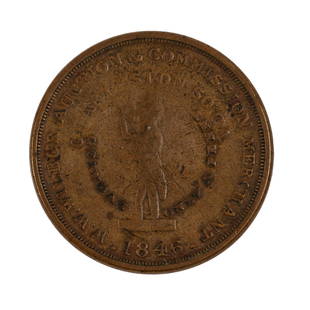
Winfield Scott Re: “Humanity” for Wounded Brit Prisoners after American Victory at Fort
Similar Sale History
View More Items in Militaria & War Memorabilia
Related Militaria & War Memorabilia
More Items in American Militaria & War Memorabilia
View MoreRecommended Collectibles
View More



Item Details
Description
From American headquarters at recently captured Fort George, Colonel Winfield Scott reports to his counterpart in the British Army, John Haney, that he has returned wounded prisoners on board a cartel ship to the British army. Scott also promised kind treatment of wounded Lieutenant Colonel Christopher Myers.
WINFIELD SCOTT, Autograph Letter Signed, to John Haney, June 21, 1813, Fort George, Ontario. 2 pp., 8" x 12.5". Expected folds; very good.
Complete Transcript
Adjt Genl Office Hd Qrs U States
Army Fort George June 21st 1813
Sir,
Since writing the accompanying letters of this date Major Genl Dearborn influenced rather by considerations of humanity than the example of the Enemy, has consented to the removal in parole of such serjeants & rank & file prisoners of war at this place as have been maimed or otherwise badly wounded. As many of that description therefore as can be removed with safety will accordingly be delivered to Capt Irvine in board the cartel. It is deeply regretted by the General commanding that considerations above suggested do not permit him to grant a like permission in the case of Col Myers who would otherwise be entitled to every indulgence. However whilst this Officer shall remain in our hands no attentions towards him shall be pretermitted which it may be in our power to bestow.
I have the honor to be / Sir
Yr most ob Svt
W. Scott / Adjt Genl US Army
J Haney E
Dep Adjt Genl.
British Army
Historical Background
At the beginning of the War of 1812, the British had fortified Fort George on the western bank of the Niagara River as it enters Lake Ontario, and the Americans had erected Fort Niagara on the eastern side of the river.
On May 15, 1813, Colonel Winfield Scott began his appointment as adjutant general to Major General Henry Dearborn, commander of U.S. forces on the frontier with Canada, after his exchange following his capture at the Battle of Queenston Heights the previous year.
On May 27, Winfield Scott led the first brigade in the Battle of Fort George, landing from the shore of the lake, supported by an American fleet, rather than the shore of the Niagara River, as the British commander had expected. Although Scott's forces routed the British commanded by Lieutenant Colonel Christopher Myers (1774-1817), orders from American Brigadier General John Parker Boyd forced Scott to halt the pursuit of the retreating British forces. The Americans were left in possession of Fort George with approximately 280 prisoners, just over half of whom were wounded. Lt. Colonel Myers, the Assistant Quartermaster General for the British Army was likely captured at this time.
After the victory at Fort George, the Americans were slow to advance up the Niagara peninsula, allowing the British forces to regroup and launch a surprise attack at the Battle of Stoney Creek on June 6. A brief but intense battle produced heavy casualties on both sides. The Americans captured 52 prisoners, and the British captured 100 prisoners, including two brigadier generals, one major, three captains, and a lieutenant.
Winfield Scott (1786-1866) was born in Virginia and attended the College of William & Mary but left to study law. He was admitted to the bar in 1806 and served as a corporal of cavalry in the Virginia militia in 1807. In 1808, he received a commission as captain in the newly expanded U.S. Army. He raised a regiment from the Petersburg and Richmond area and traveled with them to New Orleans to join their regiment. He soon clashed with General James Wilkinson and was court-martialed for disrespectful comments and poor record-keeping. His commission was suspended for one year, and he returned to Virginia, where he practiced law and studied military strategy and tactics. He rejoined the army after his suspension and led forces in three invasions of Canada, receiving a battlefield wound, promotion to brevet major general, and a Congressional Gold Medal. He was one of four brigadier generals in the demobilized U.S. Army after the War of 1812. He led forces in a variety of minor wars and near-wars over the next two decades. By the late 1830s, he was discussed as a possible presidential candidate for the Whig Party. In 1841, he became the Commanding General of the United States Army. During the Mexican War, Scott presided over the expansion and equipping of the army, while Zachary Taylor led troops into northern Mexico. In 1847, Scott led the army in the successful siege of Veracruz, in cooperation with Commodore David Conner of the U.S. Navy. Scott then marched his army to Mexico City, winning victories at the Battles of Cerro Gordo, Contreras, and Churubusco, and culminating with the capture of Mexico City in September. This victory forced Mexican leaders to negotiate the Treaty of Guadalupe Hidalgo, which ended the war in February 1848. As the army's senior general, Scott supported the Compromise of 1850, and the Whigs nominated him for president in 1852. Scott suffered the worst defeat of any Whig candidate for president, winning only four states and losing the election to Democrat Franklin Pierce. In 1855, Scott was promoted to brevet lieutenant general, the first to hold the title since George Washington. During the Civil War, Scott strongly supported the Lincoln administration and developed the Anaconda Plan strategy for capturing the Mississippi River and blockading southern ports to end the rebellion without major loss of life. Frustrated by Lincoln's failure to seek his counsel, Scott resigned in October 1861. After a trip to Europe, he retired to New York and wrote his memoirs.
John Haney (1778-1852) was commissioned into the 80th Regiment of Foot in 1794 and served in France, Egypt, and India. He went to Canada in 1813 and served as a lieutenant colonel during the War of 1812. He participated in the British victories at the Battle of Stoney Creek (June 1813), and the Battle of Crysler's Farm (November 1813). He served as Deputy Assistant Adjutant General to commanding General John Vincent. After the War of 1812, he held several governmental posts in Canada, including Lieutenant Governor of Prince Edward Island (1836-1837), Lieutenant Governor of New Brunswick (1837-1841), Civil Governor of Newfoundland (1841-1846), and Lieutenant Governor of Nova Scotia (1846-1852).
This item comes with a Certificate from John Reznikoff, a premier authenticator for both major 3rd party authentication services, PSA and JSA (James Spence Authentications), as well as numerous auction houses.
WE PROVIDE IN-HOUSE SHIPPING WORLDWIDE.
Buyer's Premium
- 25%
Winfield Scott Re: “Humanity” for Wounded Brit Prisoners after American Victory at Fort
Shipping & Pickup Options
Item located in Wilton, CT, usPayment

Auction Curated By





























![American Coin Silver Nautical Speaking: Horn, Presented to Capt. James D. Bulloch possibly Philadelphia, mid 19th century, base with engraved Steam Ship [Black Warrior] and mountains with lighthouse, applied shell, seagulls, barrels and bea](https://p1.liveauctioneers.com/33/83430/43146205_1_x.jpg?height=310&quality=70&version=1450885292)



![[FLAGS - WORLD WAR I]. 48-star "Buy War Bonds" American parade flag. 1918.: [FLAGS - WORLD WAR I]. 48-star "Buy War Bonds" American parade flag. 1918. 16 3/4 x 28 3/4 in. cotton flag with 48 printed stars configured in 8/8/8/8/8/8 pattern (occasional soiling, few small pinhol](https://p1.liveauctioneers.com/197/309287/165438847_1_x.jpg?height=310&quality=70&version=1699649440)







![[CIVIL WAR]. Soldier's Letter w/ Revealing Racist Remarks, POW Chancellorsville, DOD Annapolis: Autograph letter signed by George S. Hill (1841-1863), Co. I, 27th Connecticut Infantry. Camp near Falmouth, [Virginia], 7 April 1863. 3 pages, 8vo, 6 3/8 x 8 in. George S. Hill of Madison, Connecticu](https://p1.liveauctioneers.com/7226/325455/175169055_1_x.jpg?height=310&quality=70&version=1712370394)



![[CIVIL WAR] CSA General Isaac Trimble’s Book, WIA & POW Gettysburg, Pickett’s Charge: Alexis de Tocqueville. Henry Reeve, translator. Democracy in America. New York: George Adlard, 1838. 8vo, publisher’s brown-green cloth. Second American Edition. Inscription as prisoner-of-war t](https://p1.liveauctioneers.com/7226/325455/175169054_1_x.jpg?height=310&quality=70&version=1712370394)



![[CIVIL WAR] Confederate Prisoners at Rock Island: Outdoor albumen CDV of guards and POWS at attention. Rock Island Barracks, Illinois: Josh Smith, ca 1864-1865. Photographer's imprint to verso, identifying Smith as "Post Artist." Residue of removed r](https://p1.liveauctioneers.com/7226/325455/175169082_1_x.jpg?height=310&quality=70&version=1712370394)
![[CiVIL WAR] Candid Letter re: Prostitutes: Autograph letter signed by William Hawkins to Uncle Bobby. Philadelphia, Pennsylvania, 26 May 1864. 3 pages, 8vo. A ribald letter sent from a man named William Hawkins to his Uncle Bobby during the Ci](https://p1.liveauctioneers.com/7226/325455/175168996_1_x.jpg?height=310&quality=70&version=1712370394)
![[REVOLUTIONARY WAR] 1783 Treasury Receipt re: Robert Morris: Autograph document signed by John Lawrence. Hartford, Connecticut, 31 March 1783. 1 page, 8 1/4 x 7 5/8 in. Docketed and signed by Captain Jabez Perkins to verso. A scarce treasury receipt document fr](https://p1.liveauctioneers.com/7226/322253/173251483_1_x.jpg?height=310&quality=70&version=1710004847)

![(1865) Distress re: Fall of the Confederacy: Autograph letter signed by Agnes E. Patteson (b. 1835), to her cousin Jim. Hickory Hill, [Hinds County, Mississippi], 9 July 1865. 3 pages, 4to, 7 5/8 x 9 3/4 in. A fascinating letter written in the i](https://p1.liveauctioneers.com/7226/325455/175169172_1_x.jpg?height=310&quality=70&version=1712370394)
























![George Washington Signed Discharge: Partly printed discharge document signed by George Washington, as Commander in Chief of the Armies of the United States. Newburgh, [New York], 4 January 1783. 1 page, ## x ## in. Undersigned by Washin](https://p1.liveauctioneers.com/7226/322253/173251475_1_x.jpg?height=310&quality=70&version=1710004847)



